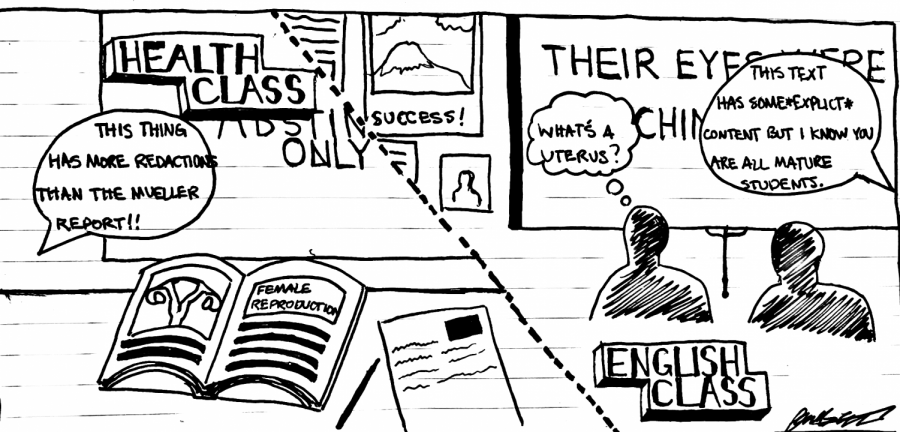Teaching Hypocrisy
May 15, 2019
Every day in Utah public schools, students are relayed conflicting information based on what the Utah Board of Education deems appropriate for high school curriculums. Education in an abstinence-only state is confusing to begin with, but the discrepancies between health classes and English classes are a whole other story. A health class is where students should be able to go to receive sexual education so they can stay safe and aware (when it comes to STDs, pregnancy, and consent), yet more insightful content is taught to students in English classes via literature than is ever taught in the single unit on sexual education in health class.
For example, texts such as Romeo and Juliet by William Shakespeare feature graphic moments which are, for some unknown reason, acceptable to talk about in an English class, but not a health class. For example, Scene I Act I, Sampson says, “Women, being the weaker vessels, are ever thrust to the wall:–therefore I will push Montague’s men from the wall, and thrust his maids to the wall.” A similar scene on page 99 of The House on Mango Street by Sandra Cisneros compares as follows: “It wasn’t what you said at all. What he did. Where he touched me, I didn’t want it, Sally. The way they said it, the way it’s supposed to be, all of the storybooks and movies, why did you lie to me?” Both of these texts heavily allude to scenes of sexual assault, and Mango Street mentions the fanciful nature of idealized sex and the dangers that can grow up with teenagers if they think peer-taught sex tips are factual. And no, censorship of literature is not the solution to this problem, the way students acquire sexual education is. It would appear that the State of Utah genuinely wants teenagers to approach the topic of sex haphazardly.
Meanwhile, English educators must tip-toe around the true meaning of these scenes due to not knowing of either student will understand what they are talking about, (due to inadequate sexual education) or not knowing what is deemed appropriate to talk about while still doing a piece of literature justice.
The bottom line here is that students are reading dramatized and fantastical depictions of sex are alluded to in literature, which is a stark difference from reality. Macbeth by William Shakespeare, on the 11th-grade reading list, holds plenty of allusions to sex. For example, the weird sisters cast a spell to “drain” a sailor “dry as hay” so he won’t be able to have children with his wife and Lady Macbeth insinuates that her husband is impotent in the bedroom when she goads him into killing King Duncan. These allusions continue on through Porter’s dirty jokes leading to the discussion of the male’s performance (or lack thereof). He expresses that drinking an abundance of alcohol puts men in a mood for a “little fun” but also makes them hard to function. These conversations are vastly different from what is taught and learned in high school health classes. The fantasized idealization of sex in high school literature leads to the wrong impersonation from what it truly is. The reality is that students are learning about explicit content through improper media resources.
Adding to the dysfunction, Utahn sexual education is lacking in three of the most important topics in a health class: consent, contraception, and sexually transmitted infections (STI). Two of these topics can be approached, but they can not be adequately covered in class due to restrictions dictated by state laws. Trying to read Utah sex education laws starts to feel a bit like falling down a rabbit hole that never ends, so here is the gist: teachers must stress abstinence-only topics, can not mention consent, and cannot refer students who are afraid they have an STI or unwanted pregnancy to health professionals or give them any advice.
Again, the lack of information and misguided, bias advice teachers must give is not their fault–it is the Utah State Board of Education which choose to make laws that support censorship and ignorance amongst Utah’s youth. If a teacher does answer questions honestly with a medical understanding, they could lose their jobs. The fact is that teenagers are learning unsafe information about sex in the wrong environment without the correct resources.
According to Lee Hale of KUER-FM, a news-based radio station owned by the University of Utah, some lawmakers saw to change the language in the new education law to promote the idea that “teenagers don’t have the authority to consent.” Although minors cannot legally consent to sexual advances, this does not mean that teenagers should not be able to learn the concept of consent which will undoubtedly establish a pattern for adulthood.
In Section 1, 53G-10-402, line 41-44 of the Utah Health Education Amendments, the law states that students are able to “clearly and expressly refuse sexual advances by a minor or adult… to stop the student’s sexual advances if refused by another.” The primary concern of legislators is not safe sex, but only how to save yourself when you are already in a severely dangerous environment.
The question now is what can the state of Utah do to educate future students in their health classes. Change needs to happen within the health curriculum in regards to sexual education, in order to really allow teachers to inform students on safety and awareness.
